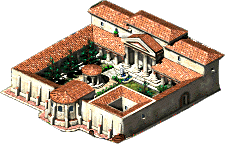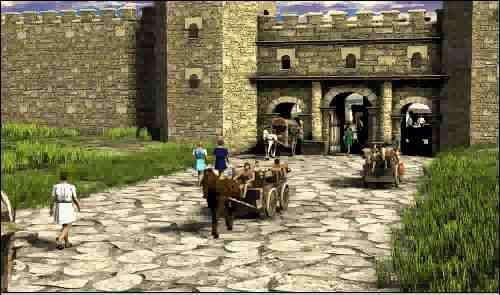The
Guild - we remake famous RT games
ROME 2 - a remake of
Caesar 3
A) About the new game:
B) The merit remains
with the authors of CAESAR 3
Our
motives & goals
A-1)
RANGES
There are 9 kinds of structures in ROME
2:
Water- providing
structures:
reservoir(10), aqueduct(0), fountain(3
in desert-4 elsewhere), well(2)
Health:
clinic(20+w), hospital(30+w), bath-house(20+w),
barber shop(20+w)
Religion:
temple small(20+w), temple large(30+w),
oracle(0)
Education:
school(20+w), library(30+w), academy(30+w),
mission post(20+w)
Entertainment:
theater(20+w), amphitheater(*+w), actor
colony (*+w),
hippodrome(*+w), chariot maker(*+w),
coliseum(*+w), gladiator school(*+w),
lion house(*+w)
Government:
senate(*+w), forum(*+w), governor's house(0),
governor's villa(0),
governor's palace(0), statue small(0),
statue medium(0), statue large(0)
Engineering (Maritime
& Civil):
garden(0). plaza(0), engineers' post(20+w),
bridge small(0), ship bridge(0),
dock(0), shipyard(*), wharf(*)
Military &
Police:
wall(10), gatehouse(10), tower(20), fort(*),
barracks(*), military academy(*), prefecture (20+w)
Farming &
Industry:
farm(*), clay pit(*), timber yard(*),
marble query(*), iron mine(*), workshop(*), warehouse(50+w), market (30+w)
All structures have defined range of operation. It is a circle around the
structure. The radius of that circle (measured in tiles) is given above
in brackets. Asterisk (*) stands for: "the entire map". Structures with
(+w) have servicemen (wanderers - not cart pushers) going in and out of
them. We shall call these structures "service buildings".
Each house will have a complete service from any service building whose
range of operation extends at least to the part of the house. You don't
need any more to lead your servicemen to pass by the houses of your city.
You will still be able to see all these servicemen walking through your
streets, gardens and squares, but only to make a pleasing site to your
eyes.
A-2)
SATISFACTION
of the PEOPLE
In Caesar 3 there are 5 means to keep the people in good moods:
1) moods of gods (Venus above all) are transferred to the people
2) low unemployment
3) entertainment (including festivals)
4) low taxes
5) high wages
Gods were whimsical and boring. Notion of unemployment in the society of
slave owners is rather misplaced. All other services & supplies were
much less significant than entertainment. The level of entertainment was
calculated using complicated formulas. Taxes seldom needed any adjustment.
Change of wages was a monotonous side task.
In ROME 2 gods behave themselves. Unemployment rate is not being calculated.
All services/supplies have equal importance. Entertainment is no exception.
There are no festivals. Taxes are still adjustable. Wages have fixed value.
Struggle to make people satisfied is reduced to 2 activities:
1) providing all services/supplies
2) keeping the taxes close to their initial level (7%)
A-3)
RELIGION
Gods neither get angry nor happy. They neither bless you nor they punish
you. They do not participate in waging wars either.
There are no festivals dedicated to any god.
Gods are not jealous. They let you to build temples to whom you like.
Religious advisor is not informing you about the moods of gods. He informs
you about demands of people.
There is no request for the access to more than one god.
A-4)
SUPPLIES
There are no granaries - only warehouses and markets. .
The icon of a warehouse is no more an open platform. It is a building with
a roof. All warehouses accept all kinds of supplies. Everyone
of them has a separate stock. All markets in their range have the entire
stock at their disposal.
You don't need to distribute the stock around the city. The entire stock
of any warehouse is available simultaneously in all houses located in the
range of the warehouse and/or ranges of markets connected to the warehouse.
Numbers in dialog boxes of markets show the stock in the sum of all warehouses
covering the location of the market. Numbers in dialog boxes of warehouses
show the stock only in that particular warehouse even if some other warehouse
is covering it's location. 
In ROME 2 housing starts with hovels. There are
no tents and shacks. There are also no requirements for 2nd type of wine,
2nd and 3rd type of food. Grapes and olives are comestible like all other
types of fruits. You can restrict their use either for food or as a row
material for workshops. You can also let them be used both ways. People
will have no priorities in food.
A-5)
CULTURE
You earn points in culture rating for temples, education and theaters:
For each temple (big or small) you get 5 points until you earn total of
40 points for temples. After that you get no more points for temples. If
you move or demolish your temples, you will still have 40 points if 8 temples
have remained or 35 points if 7 have remained etc.
Likewise, For each school, library or academy you get 5 points until you
earn total of 40 points for education. After that you get no more points
for education.
For each theater you get 5 points until you earn total of 20 points for
all of them.
A-6)
DESIRABILITY
Desirability is not being calculated in ROME 2.
A-7)
POPULATION
& EMPLOYMENT
You need no house at all in order to have employees in a service building.
Each building brings along the required number of people and increases
the total population of your city by the same number.
People working in any building also have board & lodging in it. They
require no services/supplies. They do not pay taxes. On the contrary, they
are paid their wages every month from the tax money that you collect.
All people living in houses pay their taxes, no matter how far or close
they are to the senate or to the forum.
There is no kind of an employment rate and no aging in ROME 2. Hence the
unemployment is of no concern to the player.
Wages are the same in each assignment and they don't change during the
entire assignment.
Employment advisor gives you information about the number of buildings
of any particular type and about the total number of people living &
working in them.
Population advisor gives you information about the number of houses of
any particular type and about the total number of people living in them.
A-8)
BARBARIANS
You can toggle barbarians.
You can also scale any barbarian army by a factor 0.1 - 10.
A-9)
LEGION
Cavalry is much stronger in battle than legionaries or javelins. One stroke
of their sword is lethal. They are able to ride through the enemy lines
and to kill without being stopped unless being hit by 5 or more spears/daggers.
Legionaries move as fast as the javelins do. You don't need weapons for
any type of soldiers.
Number of barracks & forts is not limited. Soldiers from the first
barracks & first 6 units are paid normal wages. Soldiers from all other
barracks and units are paid 3 times more.
There is a new button in military advisor's dialog box. It will dismiss
the selected unit in which case soldiers do not die. They change their
clothes and leave the city as regular emigrants.
The morale of the soldiers is not decreasing when they dwell outside of
their camp. Barbarians can destroy a fort. It is not going to kill the
cohort.
Towers do not need roads. Their employees dwell in the tower. Guards (sentry)
can come to the tower through the terrain without any road.
A-10)
ENERTAINMENT

Number of hippodromes is not limited. Employees from the first hippodrome/coliseum/amphitheater
are paid normal wages. Employees from any other hippodrome/coliseum/amphitheater
are paid 20 times more.
The same is valid for senate.
You can rotate a hippodrome by 90 degrees before placing it.
There are no festivals. Entertainment advisor has 15 different buttons
to allow you to play entire intro or any sequence thereof without leaving
the game. It will have no influence on the people in the city. It is designed
to for you to enjoy it whenever you like.
Level of entertainment for any house is calculated as follows:
1=Amphitheater+Gladiator school+Actor colony
2=the above+(Hippodrome+Chariot maker)/(Coliseum+Lion house)
3=the above+Theater
A-11)
PEACE
RATING
You will get 40 points when you defeat barbarians for the first time. When
you defeat them once more you get 30 points. For the third victory you
will get another 20 points, and for fourth victory you will get your last
10 points. Subsequent victories can bring you no more than 10 points.
You will lose points each time when barbarians, locals or gladiators destroy
anything in your city. For each destroyed building/house you will lose
a point.
A-12)
NATIVES
Native houses/buildings can be demolished using the demolition tool (shovel).
When you do it you can not toggle barbarians.
A-13)
EARTHQUAKES
There are earthquakes and other natural disasters. These other disasters
are what used to be curses of gods in Caesar 3. They are prescheduled on
any map
Ridges remaining after the earthquake you can cross using the bridges.
You can toggle natural disasters all together.
A-14)
MAPS
Maps are exactly the same as they were in Caesar 3.
You can scale the target population by factor 0.5 - 2.
A-15)
INTERNAL
TRANSPORTATION

In Caesar 3 the only means of internal transportation were carts circulating
among the granaries and warehouses plus market ladies. In ROME 2 there
are no granaries and market ladies have lost their function. Game machine
was even in Caesar 3 loaded with bugs concerning transportation among warehouses.
Hence, the new type of transportation was needed.
What used to be weapons workshop is now a blacksmith. The blacksmith is
also a maker of wagons.
What used to be a hog farm is now a sheep farm. What used to be a vegetable
farm is now a horse farm. For both these farms you need a fertile soil
In order to have an operating wagon you need to have 4 prerequisites: horses
from the horse farm, iron, timber and an operating blacksmith. You get
the wagon with horses by purchasing it from the trade advisor, but they
will not operate until all pre-requisites are met.
You can right click the wagon to open it's assignment dialog. There you
can set the automatic route for it (including the specification of commodities
and their loading location plus destination).
A couple of wagons shall completely resolve all your troubles with internal
transportation. The number of wagons is not limited. They all require the
same wages. Barbarians will destroy them before anything else.
A-16)
OVERLAYS
Overlays show no more pipes or pillars. They still show houses/buildings
as two dimensional squares. The squares representing houses that are receiving
the chosen kind of service are painted in blue as they used to be in desirability
overlay.
B)
The merit remains with the authors of CAESAR 3:
ROME was basically Caesar 3 with a patch. On the contrary, ROME 2 is
a remake of Caesar 3. Our goal was to
enable the player to enjoy the outstanding features of the original game.
We felt that the game was not rewarding enough. The most part of the program
remains as it was. Therefore, ROME 2 is by no means our own creation.
We hope to finish ROME 2 in a year or so. It is due to the small number
of people in our team that we can not do it sooner than that. Meanwhile,
should people from Sierra and Impressions find some of our ideas interesting,
while working on their own new version of Caesar 3, they are more than
welcome to use them. We shall have no objection if they do.
After finishing ROME 2, we do not intend to sell it to anyone. We intend
to offer it to Sierra first so that Sierra my give it for free to all registered
customers of Caesar 3. Should they not be interested in our contribution
to their game, we intend to offer it as a freeware to the entire internet
audience. (It is still going to be illegal to sell it to anyone.)
BACK

